
Electronic english version since 2022 |
The newspaper was founded in November 1957
| |
Youth and science
Students reported on their papers
The second stage of the JINR IT school - Spring School on Information Technologies was held on 15-16 April in a mixed format at MLIT JINR. 31 students from the universities of Vladivostok, Vladikavkaz, Dubna, Moscow, Petropavlovsk-Kamchatsky, St. Petersburg and Chelyabinsk presented their papers completed over six months under the supervision of researchers from the Institute.
"We invite mainly fourth-year undergraduate and second-year master's students to the first, autumn stage," Chairman of the Organizing Committee, Scientific Leader of MLIT V.V.Korenkov said on the opening day of the School. "That is, those who are going to defend their graduate papers during this academic year. At the first stage, for a week, we talk about the research topics of JINR and MLIT, carry out master classes, hackathons and lectures, we do everything so that they are inspired by our topics and choose, so to speak, a consultant and sometimes even a leader. Returning to their universities, they agree on the chosen topics of bachelor's or master's paper with their supervisors and having received consent, begin to work on them. The work schedule is different: for some it is remote, especially if these are the universities of Vladikavkaz, Vladivostok and Petropavlovsk-Kamchatsky, although the participants have come here from Vladivostok for three months to practice.
During the Spring School, we sum up the results. Its first goal is to show what the participants have accomplished during this time. Interesting and useful papers can be brought up to our standards and put into operation in the laboratory. The second goal is to train students before the upcoming defense. We analyze each report, ask quite a lot of questions, make recommendations and comments. On each of the two days of the School, we select the five best reports and award the winners with prizes. We hope that many of them will remain our friends and colleagues after their defense. Some, I hope, will work with us and even if in other places, we will not lose contact. We will already know which one of them is capable of what and if necessary, invite young people to any of our projects for short-term or permanent work.
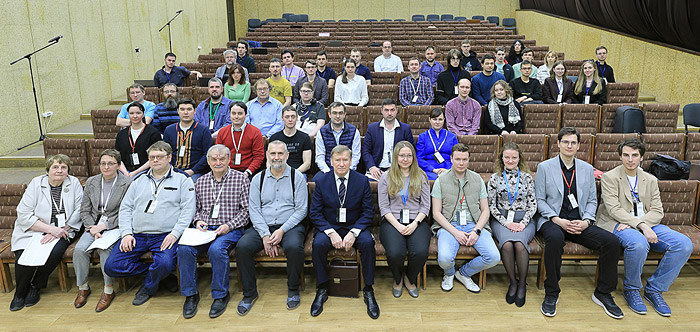
In the field of computing, no one specifically trains specialists for megascience projects, but this stream of personnel that we have organized will make it possible to obtain more specialists familiar with this topic and many of them will be included in our activities. Last week, together with colleagues from the Kurchatov Institute Research Centre and the Institute of System Programming, we held a working meeting at which we discussed what our IT consortium would look like (the agreement on its development was signed on 5 February - O.T.) and that scientific IT infrastructure that we currently jointly develop, how cooperation will be organized with Directorate of collaborations using this infrastructure: data storage, analysis and processing. And today's School develops a personnel potential that could further participate in our consortium, in the development of this infrastructure. It will be geographically distributed, not only on the basis of our three institutes. We hope that over time, institutes and universities of the Central Federal District, the Urals, Siberia and the Far East will join to it. It means that there should be specialists in all these regions."
D.I.Israpilov participated in the School:
"I am Head of the JINR Information Centre that is open at the Vitus Bering Kamchatka State University. Our initial goal was to attract students to world science, also to attract schoolchildren, to expand the circle of our applicants, using, among other things, the JINR brand. We do not set a goal to attract all our students to the Joint Institute, but we should involve them in science. The participation of Kamchatka University students in such a school indicates that the task is accomplished and this is good. We want to see what needs to change in their preparation to make the results better."
Head of the MEPhI department A.A.Artamonov came with his students:
"Today, there was a good series of reports on testing and development of server equipment monitoring systems. The students have some work to do, but in general, it's a good start. As for our colleagues and these are young people from MEPhI and South Ural University, they are all on the rise, everyone is ready to continue this topic: first-year master's student Daria Podryadova from South Ural State University makes a recommendation system, tested it together with colleagues from Dubna and wants it to be implemented at the next stage and also to continue work in this area. Ivan Sokolov makes his own system related to data visualization, based on publications by JINR employees. So, everything is fine, we're moving."
Ivan Sokolov (MEPhI):
"After my speech, I received good advice to talk about what task the paper was performed to meet. Just like all the participants, I am working on two topics and before tomorrow's speech, I will think about how to refine and supplement it. I haven't thought about the possibility of working at JINR yet, but I would like to."
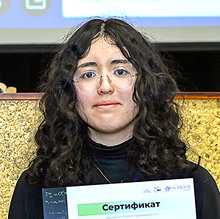 |
| Erica Shukrinova |
"The topic of my paper is the development of a corporate identity for MICC MLIT, this is a very broad topic. It is a little different from other papers in the section, so it was very interesting to listen to other speeches, I learned a lot of new things and one rarely experiences such contact with people in everyday life, in general, School was a good experience, I liked it. In the lectures of the autumn part of the School there was a lot of useful information for me, but not everything, because physics is not my thing and in information technology I have a bias in design. But it was interesting to learn about the MICC, they gave us a good tour, it was very interesting."
"Based on the results of the Autumn School, we have developed five thematic areas in which the participants worked from November to March," the School's academic secretary D.I.Pryakhina says. "Today, they present their results, some are more or less final, others are intermediate. Students are going to develop them at the next stage of education, in master's or graduate school and some of the speakers work in our laboratory on some part of the staff and apply their results in real work. Moreover, these are not only students from Dubna University, there is a student from North Ossetian State University and participants from last year's School from Tula and St. Petersburg universities currently work at MLIT.
Other universities also show interest in our School: at the next Autumn School, the geography of participants and the topics of study may expand. At present, in addition to the tasks at MLIT, students are offered topics by scientific supervisors from LRB, DLNP and VBLHEP. I think other laboratories will join us in the future."
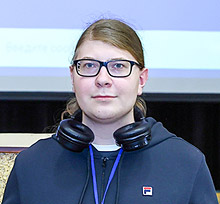 |
| Vladimir Semashko |
"We develop a geoinformation system for the Institute, consisting of various large parts," Scientific Leader S.V.Semashko (MLIT) clarifies. "It turns out that everyone takes part in all parts of the project - in some ways more, in others less.
Was the autumn part of School useful for you? - a question to Vladimir.
- I'm not sure, I have an ambiguous attitude towards theory, I specialize more in the practical application of programming and learning on the go. It turns out well: you can quickly assimilate some information about a new technique and on the go you need to find something, implement it and somehow modify already established techniques of meeting issues.
Did your grandparents (LHTA employees Galina Lvovna and Vladimir Semashko) influence your passion for programming and your choice of specialty?
- Of course, my grandmother influenced me; I no longer found my grandfather alive. And I spent a lot of time with my grandmother in childhood, before School and then she already began to instill in me a love of programming.
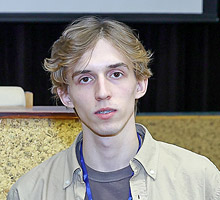 |
| Nikita Ilyin |
Currently, I am a first-year master's student that works in Yandex in a mixed format and does scientific work. I hope to start working at MLIT after defending my diploma."
Nikita's university colleague Petr Doroshev also shared his impressions: "For me personally, school is a good opportunity to practice public speaking. In fact, this was the first experience and of course, quite exciting, but very important for me. All this will be useful in the future, so I am very grateful to the organizers for this opportunity. I heard some pretty interesting reports; it's useful to know what others are engaged in and what projects they work on."
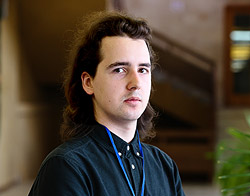 |
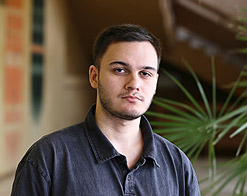 |
| Petr Doroshev | Alan Gazzaev |
Alan Gazzaev (ITMO University, St. Petersburg) spoke about himself and his fellow countrymen from North Ossetian State University:
"We came from Vladikavkaz in two teams. The first develops a catalog of events for the SPD facility, the second develops a database containing the required data about the facility components. In total, we will give six reports at the School. There were interesting reports, for example, regarding the process orchestration system, this is similar to what we do, only at BM@N. I have been participating in the project at VBLHEP since my undergraduate studies and today, I have become a JINR employee; the other participants have also been working since their junior years. For example, third-year students from the Faculty of Physics and Technology of SOGU that came to this School, are already involved in VBLHEP projects. And they will defend their theses on these topics and I think, will come here to work."
Alan is supplemented by Scientific Leader F.V.Prokoshin (DLNP):
"Let me explain a little: two projects are currently implemented - a database of equipment for the SPD facility and an event index, a catalog of physical events of this experiment. We work on the first project for six months, on the second - about a year. The event index project is based, among other things, on the experience gained in the ATLAS experiment; we use an ideological concept, but the implementation is carried out on a completely different platform, using other means and with adaptation to the experiment. Both projects are at the prototyping stage. Since the event index project is more multi-component, only half of its components have been developed so far. As other systems are ready for the SPD experiment, we will further develop our project. I hope that the students will improve their skills during this project, stay with us and continue this work."
Olga TARANTINA,
photo by Igor LAPENKO